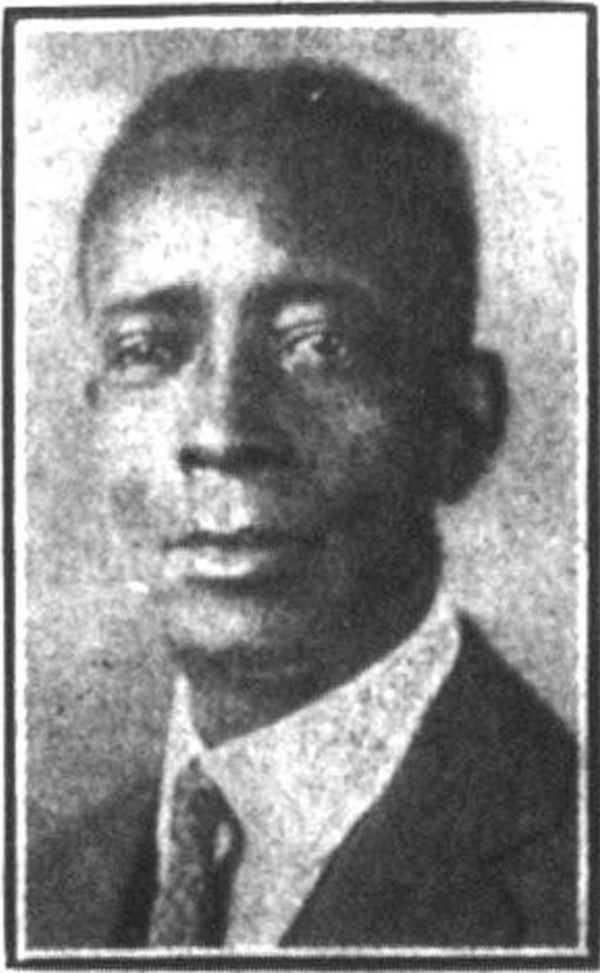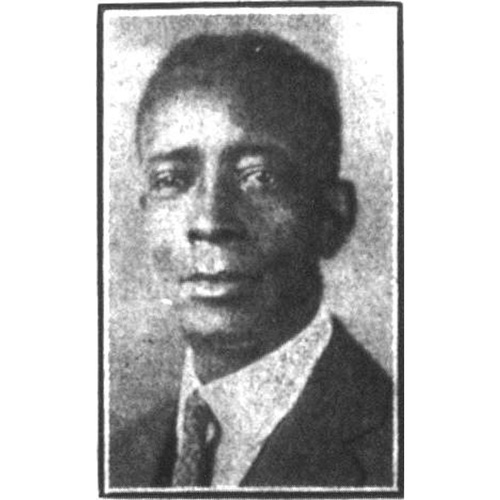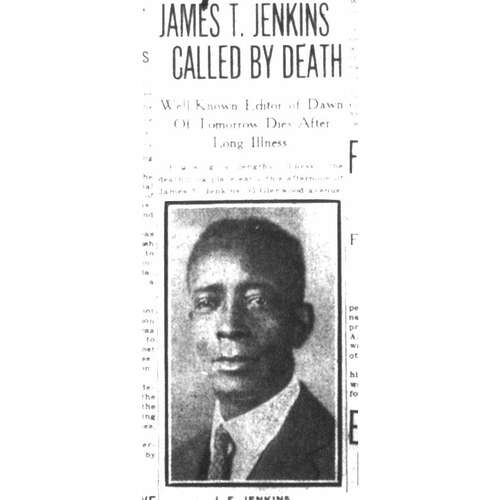
Source: Link
JENKINS, JAMES FRANCIS, journalist, labourer, newspaperman, and social activist; b. probably 1875 in Forsyth, Ga, son of James Jenkins and Mary Jane Peeples (Peoples); m. 30 April 1913 Eliza Christina Groat (d. 1967) in London, Ont., and they had four sons and four daughters; d. there 6 May 1931 and was buried in Mount Pleasant Cemetery.
James F. Jenkins grew up in a Black community in central Georgia during an era of racism and hostility towards Blacks in the American south. His father was a grocer, and his mother managed a full household of at least four children while ensuring that they, as well as a teenage female servant, received an education. James attended normal school at Atlanta University before enrolling in its college course in 1899. It was probably during his student years that he met renowned civil-rights activist William Edward Burghardt Du Bois. After earning a ba in 1905, Jenkins moved to Chicago; there he took a business course and wrote articles for the Moon Illustrated Weekly (Memphis, Tenn.), a short-lived periodical established by Du Bois. Unlike Booker Taliaferro Washington, who sought incremental improvements to the lives of Blacks within the framework of racial segregation, Du Bois, one of the founders of the National Association for the Advancement of Colored People in 1909, pushed for full racial equality. He had a major influence on Jenkins, who developed a similarly uncompromising style of advocating for civil rights.
By 1913 Jenkins had moved to London, Ont., where he married Eliza Christina Groat and spent the next ten years working as a labourer and journalist. Over time he became deeply troubled by what he described in a 1923 letter to Du Bois as the “cold studied indifference on the part of the Whites towards our People” in Canada. Blacks were usually relegated to menial jobs and were employed as porters or domestics, while those with the most skills and education were increasingly emigrating to the northern United States to find employment. Canada did not have explicit Jim Crow laws enforcing segregation, but it did have customs that prevented social equality, such as those that denied Blacks service at restaurants and turned them away from hotels. Although what he would later describe as the “most barbarous aspects” of racism in the United States, such as lynchings, were not found in his adopted country, Jenkins told Du Bois that anti-Black sentiment in Canada was “just as bad as any form of prejudice which we meet in the Republic south of us.” Nevertheless, he was quite optimistic that Canada could be an exemplary place that treated all its citizens fairly, regardless of their race, colour, or creed, and vowed to do something to bridge the racial divide.
On 14 July 1923 Jenkins founded the Dawn of Tomorrow, which he edited out of his home at 95 Glenwood Avenue in London. His wife, Christina, became its advertising manager, and Robert Paris Edwards, an assistant editor, contributed to some of the early issues. The eight-page newspaper, which appeared weekly until 1926 and then twice a month until 1931, had a peak circulation of 4,000 to 5,000 and was, by its own account, “enthusiastically received from the Atlantic-bound shores of Nova Scotia, to the Pacific-kissed coasts of British Columbia.” Jenkins expertly edited the Dawn, using it to educate a multiracial audience about the experiences of Blacks in North America and around the world. The newspaper stressed that Canadians shared a common “loyalty to one king, one flag, and one empire,” but wondered what had become of “the spirit of British justice and fair play” that had existed in the era of the Underground Railroad [see Harriet Ross*] or even during “the days of Governor [John Graves] Simcoe*.” Much like Mary Ann Camberton Shadd*, a Black American journalist who had migrated to Upper Canada during the mid 19th century, Jenkins favoured integration, envisioning a country in which there was “no distinction in citizenship” and declaring that “the white, the brown, the yellow and the black races must all march to a common ideal abreast.” This appeal seems to have resonated locally: in December 1923 Jenkins was elected third vice-president of the London Brotherhood Federation, a body predominantly composed of white churches.
Jenkins also argued that to fight racism, it would be necessary for Black Canadians to develop a greater sense of unity and cooperation. Living in communities scattered throughout the country [see William Peyton Hubbard; James Alexander Ross Kinney], they possessed neither a national organization nor, in his view, a strong sense of “race consciousness.” Through the Dawn he encouraged them to identify as “members of a common race,” reasoning that this attitude would be a practical measure to help advance the goal of equality because “the Caucasian races have placed us all in the same category.” Each issue had a comprehensive section for local news and events, which helped connect Black Canadians in communities across the nation. The paper was not, however, universally well received. Some readers disliked its employment of the term “Negro,” a usage that was more common in the United States than in Canada, where “coloured” was often preferred. More significantly, Jenkins offended Black Canadian clergymen when he accused them of passively accepting the socio-economic injustices endured by their congregations. In 1929 he would further offend them by criticizing the British Methodist Episcopal Church [see Richard Randolph Disney*], of which he was a member, for refusing to join with the United Church of Canada [see Samuel Dwight Chown; Clarence Dunlop Mackinnon], and he would be denounced by the general superintendent of the BMEC as a result.
In August 1924 Jenkins was the prime mover and one of the seven founders of the Canadian League for the Advancement of Colored People. Modelled on the National Urban League, a civil-rights group in the United States, the CLACP was based in London and received its federal charter of incorporation on 16 Jan. 1925. Primarily a social-welfare organization, the league lobbied for professional opportunities for Black Canadians, assisted with job placements, provided goods and services to the needy, and supported youth education. It also promoted interracial cooperation; influential whites, including political titan Sir Adam Beck*, judge William Renwick Riddell*, and historian Frederick Landon*, were among its board members. The Dawn became the league’s official organ in 1925, and as its first executive and organizing secretary, Jenkins toured Ontario to rally interest and set up branches in such places as Chatham, Windsor, Dresden, and Toronto.
In May 1925 Gesner Quintin Warner, who sat on London’s Juvenile Court, asked Jenkins to assist him in all cases involving Black children. He fulfilled this task, while continuing to edit the Dawn, until his untimely death from heart failure on 6 May 1931. Although the league, struggling to raise funds during the Great Depression, subsequently withdrew its financial support from the paper, Jenkins’s widow published it intermittently until 1953, and the Jenkins family would still be putting out occasional issues in the early 21st century. An activist who used the Dawn and the CLACP as tools to combat racism, James F. Jenkins worked to usher in a day when Black Canadians were entitled to, as he put it, “a man’s chance in this country, a chance which all British subjects should have.” He inspired others to fight for what he called the “righteousness of our cause” in the British part of North America.
James Francis Jenkins was the publisher and editor of every issue of the Dawn of Tomorrow: Devoted to the Interests of the Darker Races (also titled the Dawn of Tomorrow: the National Negro Weekly Devoted to the Interests of the Darker Races (London, Ont.)) from July 1923 until May 1931. Issues of the newspaper are held on microfilm at the D. B. Weldon Library of Western Univ. (London, Ont.).
There are considerable discrepancies in official sources about the birth year of Jenkins, who appears to have assumed a younger identity after moving to Canada. His marriage and death records indicate that he was born in 1884 and the 1921 census of Canada gives 1886, but the earliest extant record relating to Jenkins, the 1880 United States census, strongly suggests that he was born in 1875.
AO, RG 80-5-0-635, no.009413; RG 80-8-0-1285, no.023727. Buxton National Historic Site & Museum (North Buxton, Ont.), Canadian League for the Advancement of Colored People coll., letterhead and minutes. LAC, R233-114-9, Ont., dist. Middlesex East (102), subdist. London (28): 12; R1002-9-1 (general index), vol.903, p.356, charters of incorporation, The Canadian League for Advancement of Colored People, LIB. 260, folio 502, 16 Jan. 1925. U.S., National Arch. and Records Administration (Washington), United States census, 1870 and 1880, Georgia, Monroe, Forsyth. Univ. of Mass. Amherst, Special Coll. and Univ. Arch., ms 312 (W. E. B. Du Bois papers, 1803–1984), J. F. Jenkins to W. E. B. Du Bois, 12 June 1923. Atlanta Univ., Bull. (Atlanta, Ga) (1891–92); Catalogue of the officers and students of Atlanta University, … 1891–92 (1892). Agnes Calliste, “Sleeping car porters in Canada: an ethnically submerged split labour market,” Canadian Ethnic Studies (Calgary), 19 (1987), no.1: 1–20. Canadian League for the Advancement of Colored People, First convention of the Canadian League for the Advancement of Colored People … ([London, Ont., 1927]). S.-J. Mathieu, North of the color line: migration and black resistance in Canada, 1870–1955 (Chapel Hill, N.C., 2010). Barrington Walker, “Finding Jim Crow in Canada, 1789–1967,” in A history of human rights in Canada: essential issues, ed. Janet Miron (Toronto, 2009), 81–98. J. W. St G. Walker, “Race,” rights and the law in the Supreme Court of Canada: historical case studies ([Toronto and Waterloo, Ont.], 1997). R. W. Winks, The blacks in Canada: a history (2nd ed., Montreal and Kingston, Ont., 1997).
Cite This Article
Melissa N. Shaw, “JENKINS, JAMES FRANCIS,” in Dictionary of Canadian Biography, vol. 16, University of Toronto/Université Laval, 2003–, accessed December 21, 2025, https://www.biographi.ca/en/bio/jenkins_james_francis_16E.html.
The citation above shows the format for footnotes and endnotes according to the Chicago manual of style (16th edition). Information to be used in other citation formats:
| Permalink: | https://www.biographi.ca/en/bio/jenkins_james_francis_16E.html |
| Author of Article: | Melissa N. Shaw |
| Title of Article: | JENKINS, JAMES FRANCIS |
| Publication Name: | Dictionary of Canadian Biography, vol. 16 |
| Publisher: | University of Toronto/Université Laval |
| Year of publication: | 2023 |
| Year of revision: | 2023 |
| Access Date: | December 21, 2025 |




